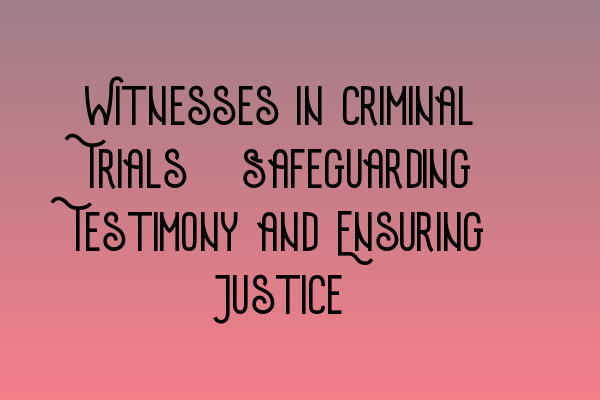Witnesses in Criminal Trials: Safeguarding Testimony and Ensuring Justice
In the criminal justice system, witnesses play a crucial role in uncovering the truth and ensuring justice is served. Their testimonies provide essential evidence that helps in establishing guilt or innocence. However, the testimonies of witnesses can be pivotal points in criminal trials. Safeguarding their testimony is paramount to maintaining the integrity of the legal process and ensuring a fair trial for all parties involved.
The Importance of Witness Testimony
Witness testimony serves as a vital tool for prosecutors and defense attorneys to present their case in court. Witnesses can provide firsthand accounts of what they saw, heard, or experienced, shedding light on events that took place during the alleged criminal act. Their testimonies help the judge and jury determine the credibility of the evidence presented, ultimately influencing the outcome of the trial.
A well-prepared witness can often provide key details that can make or break a case. However, the accuracy and reliability of witness testimony can be influenced by various factors, including memory distortion, bias, and external pressures.
Safeguarding Witness Testimony
To safeguard witness testimony, it is important to ensure that witnesses feel comfortable, safe, and supported throughout the legal process. This involves implementing certain measures to protect witnesses from intimidation, coercion, or undue influence.
1. Witness Protection Programs: In cases where witnesses may be at risk of harm or retaliation, witness protection programs can offer necessary security measures. These programs provide a safe environment for witnesses and their families, ensuring their safety while allowing them to testify without fear.
2. Expert Witness Preparation: Expert witness preparation is crucial in helping witnesses recall events accurately and present their testimony effectively. Techniques such as cognitive interviewing can be used to enhance memory retrieval and eliminate cognitive biases. Workshops and seminars on witness preparation can equip witnesses with the necessary skills to navigate the legal process confidently.
For more information on witness preparation techniques, you can check out our article on Workshops and Seminars on Criminal Practice: Expanding Your Expertise.
Ensuring Justice through Adequate Cross-Examinations
A critical part of the criminal trial process is cross-examining witnesses. Through cross-examination, attorneys have the opportunity to challenge the credibility and reliability of witness testimony. This process acts as a vital safeguard against false or misleading statements that may affect the outcome of the trial.
However, it is essential to conduct cross-examinations with fairness and respect. Attorneys should avoid tactics that may intimidate or confuse witnesses. The goal should be to elicit truthful and accurate information, rather than manipulating or misleading the witness.
Keeping up-to-date with the latest updates in UK criminal laws is crucial in ensuring proper cross-examinations. To stay informed, you can read our article on Updates in UK Criminal Laws: Staying Informed and Prepared.
Enhancing the Witness Experience
The experience of witnesses in criminal trials can significantly impact their willingness to provide testimony and cooperate with the legal process. By enhancing the witness experience, we can encourage more individuals to come forward and contribute to the pursuit of justice.
1. Supportive Environments: Creating a supportive environment for witnesses includes providing emotional support, clear communication, and adequate information about the legal process. Witness support groups and resources can alleviate some of the stress and anxiety witnesses may face.
2. SQE Criminal Law Study Groups: Joining a study group can be beneficial for both aspiring lawyers and witnesses. Study groups foster collaboration, discussion, and learning opportunities, enabling individuals to enhance their understanding of criminal law. Learn more about enhancing your study group experience with our article on Enhancing Your SQE Criminal Law Study Group Experience.
Conclusion
Witnesses in criminal trials play a critical role in upholding justice and ensuring a fair legal process. Safeguarding their testimony, providing necessary support, and conducting proper cross-examinations are essential in the pursuit of truth and fairness. By prioritizing witness protection and enhancing their experience, we can empower witnesses to come forward and contribute to the administration of justice in the UK.
To learn more about criminal law and its intricacies, you may find our article on Decoding Criminal Evidence Rules: A Detailed Analysis informative.
For an in-depth understanding of public prosecutions in the UK and the role of state prosecution, we recommend reading our article on Public Prosecutions in the UK: A Closer Look at State Prosecution.
